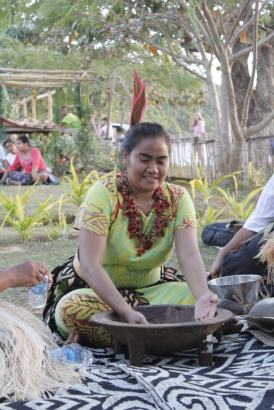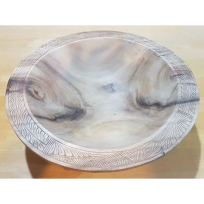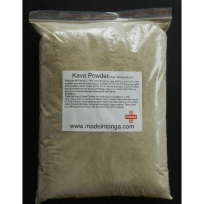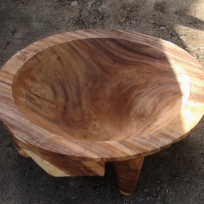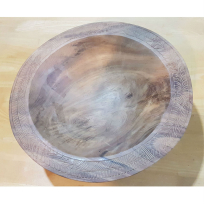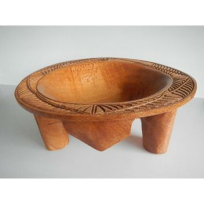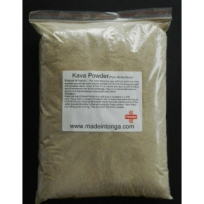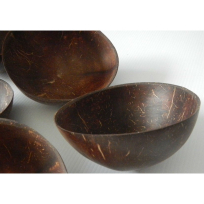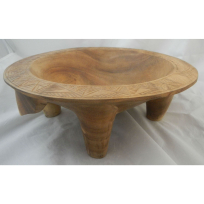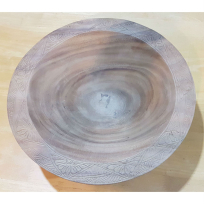Products
Shop Online
Shopping Cart

Shop Online
Kava
Email now orders@madeintonga.com to buy kava.
Kava (Piper methysticum)
Piper is Latin for 'pepper', methysticum is Greek for 'intoxicating'
Kava is grown in Tonga and the roots of the Kava plant are used to produce a drink with sedative and anaesthetic properties. In high doses it can be very relaxing and euphoric.
Kava ceremonies are an important way for Tongan men to bond with one another as a forum for communicating with open discussions on a number of social, cultural, and political issues.
Read More
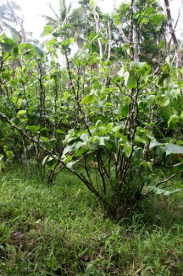
The female server is usually an unmarried, young woman called the "touʻa." In the past, this was a position reserved for women being courted by an unmarried male, and much respect was shown. These days, it is imperative that the touʻa not be related to anyone in the kalapu, and if someone is found to be a relative of the touʻa, he (not the touʻa) will leave the club for that night; otherwise the brother-sister taboo would make it impossible to talk openly, especially about courtship. Foreign girls, especially volunteer workers from overseas are often invited to be a touʻa for a night. If no female touʻa can be found, or it is such a small, very informal gathering, one of the men will do the job of serving the kava root. This is called fakatangata (all-man).
The kava is served in rounds. Typically the touʻa will first stir the kava in the kumete (wooden kava bowl), then pour some in the ipu (coconut cups) which are then passed from hand to hand to those sitting farthest away. Now days often plastic bowls and cups will replace the traditional ones during informal gatherings. The men drink, and the empty cups are returned again from hand to hand. Everybody remains seated, cross-legged, although one is allowed to stretch the legs from time to time. Meanwhile the touʻa has filled other cups for those next from the farthest away, and so the drinking goes forth until those nearest to the kumete have had their drink too. Then the men talk again (about politics, sports, tradition & culture, jokes, or anything else) or they will sing a traditional love song, often accompanied by guitar. Some now-famous string bands have had their origin at a faikava. Finally the next drinking round starts.
In Tonga, kava is drunk almost every night, however, it is mostly drunk only on Wednesday and Saturday nights. Kava drinking frequently lasts as long as eight or nine hours. With the introduction of television, rugby is usually watched by the kava drinkers, and the songs are sung in the commercial breaks. On Saturday nights, a short pause for prayer is made at midnight (as the day moves to Sunday), and then hymns replace the love songs. These hymns are mostly traditional English melodies with new words in Tongan.
All important occasions are also marked by drinking kava, including weddings, funerals, and all church-related functions. For example, when a new king takes his throne or a new chief is established in his title, he must participate in the pongipongi tapu, an ancient kava ceremony to make his rule official. These formal kava parties follow completely different rules. A male chief is now the touʻa, and the kava is very solemnly prepared by pounding the roots to powder (instead of buying of bag of already pounded kava powder). Once the kava is the right strength (as deduced from the colour), the ceremony master will call out the nickname of the first recipient using an old archaic formula ("kava kuo heka"). The touʻa will fill the cup and the cup is then brought, often by a young lady, to the intended chief, and brought back afterwards. Then the next name is called, and so forth.
31st March 2012, His Majesty, King Taufa'ahau Tupou VI consumes the ceremonial first Kava cup during the pongipongi tapu. By drinking the kava, it is an acknowledgement that His Majesty accepts his role as the King of Tonga and the people recognizing him as their new King. Kava is then served to all the chiefs and their talking chiefs, distributed under the instructions of the Royal undertaker.




